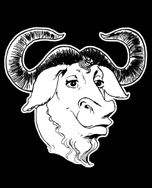 The
GNU head is
the official
mascot of the
GNU project.
The
GNU head is
the official
mascot of the
GNU project.
courtesy:
gnu.org |
The debate between the
open source community
and the traditional non-free
software contains many
parallels to political
debates over capitalism,
communism and anything
in between. As
we have seen in geo-political
issues often times it
is difficult and nearly
impossible for two philosophies
to coexist for any length
of time before one swallows
the other.
Software as most people
know it is a tangible
object. We go to
the store, buy a box
and inside are a disk
and a manual. What
you are actually paying
for, in addition to the
relatively small cost
of printing, is the distribution,
shipping, marketing and
advertising of the software. According
to open source pioneer
and author Bruce Perens,
just 10 cents on the
dollar goes toward the
actual development of
the product.
In a capitalist market
this model is in alignment
with most other products. When
we as consumers buy a
car we are paying for
more than just the metal
and glass. The
consumer is underwriting
the cost for marketing,
transportation and development.
Conversely, Richard
Stallman’s GNU
Public License (GPL)
is the standard public
license used in open
source distribution.
Unlike standard copyright
that heavily restricts
the rights of the user,
the GPL terms of use
allow programmers to
release software freely
while asserting that
the software remains
open source. The
GPL also requires all
subsequent changes to
the code to be documented
and also freely distributed.
For example: You are
the creator and programmer
of software that can
turn spoken English into
text on a computer screen. If
you wish to release this
as open source you may
want to retain some protections. The
GPL sets forth terms
that protect the programmer
from liability as well
as restricting others
from incorporating the
software in a larger
closed source package. This
means that other programmers
can take your design
and source code and,
for instance, make a
Spanish language version
of it. The requirement
is that it must remain
open source and carry
the GPL. Additionally
the GPL requires that
there not be any discrimination
against any group who
may wish to modify or
use the software.
Free Software is not
in the public domain
and the GPL restricts
anyone from taking Free
Software and incorporating
it directly into a closed
source product. Stallman
has called the collective
protections under the
GPL “copyleft.”
The Free Software Philosophy
does not mean that software
engineers and programmers
must work for free. Richard
Stallman has been quoted
numerous times comparing
Free Software to “free
speech not free beer”. The
GPL specifically addresses
the right for anyone
to charge a fee for actual
delivery of the product
(i.e. copy costs) as
well as for support of
the software and their
time to create customized
modifications as long
as the modifications
are also released under
the GPL).
This is a drastic change
for many corporate business
models. Some former traditionally
closed source companies,
such as Apple Computer
and IBM, have recently
seen potential in combining
the efforts of the open
source community with
their own in-house efforts.
|

















